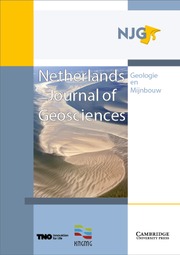Crossref Citations
This article has been cited by the following publications. This list is generated based on data provided by
Crossref.
Simmons, C. T.
Bauer-Gottwein, P.
Graf, T.
Kinzelbach, W.
Kooi, H.
Li, L.
Post, V.
Prommer, H.
Therrien, R.
Voss, C. I.
Ward, J.
and
Werner, A.
2010.
Groundwater Modelling in Arid and Semi-Arid Areas.
p.
87.
Kafri, Uri
and
Yechieli, Yoseph
2010.
Groundwater Base Level Changes and Adjoining Hydrological Systems.
p.
7.
Kafri, Uri
and
Yechieli, Yoseph
2010.
Groundwater Base Level Changes and Adjoining Hydrological Systems.
p.
43.
Kafri, Uri
and
Yechieli, Yoseph
2010.
Groundwater Base Level Changes and Adjoining Hydrological Systems.
p.
55.
Walton, William C.
2011.
Aquifer System Response Time and Groundwater Supply Management.
Ground Water,
Vol. 49,
Issue. 2,
p.
126.
Kafri, Uri
and
Yechieli, Yoseph
2012.
The relationship between current and paleo groundwater base-levels.
Quaternary International,
Vol. 257,
Issue. ,
p.
83.
Sophocleous, Marios
2012.
Retracted: On Understanding and Predicting Groundwater Response Time.
Groundwater,
Vol. 50,
Issue. 4,
p.
528.
Lofi, Johanna
Inwood, Jennifer
Proust, Jean-Noël
Monteverde, Donald H.
Loggia, Didier
Basile, Christophe
Otsuka, Hironori
Hayashi, Takeshi
Stadler, Susanne
Mottl, Michael J.
Fehr, Annick
and
Pezard, Philippe A.
2013.
Fresh-water and salt-water distribution in passive margin sediments: Insights from Integrated Ocean Drilling Program Expedition 313 on the New Jersey Margin.
Geosphere,
Vol. 9,
Issue. 4,
p.
1009.
Lofi, Johanna
Pezard, Philippe
Bouchette, Frédéric
Raynal, Olivier
Sabatier, Pierre
Denchik, Nataliya
Levannier, Arnaud
Dezileau, Laurent
and
Certain, Raphaël
2013.
Integrated Onshore‐Offshore Investigation of a Mediterranean Layered Coastal Aquifer.
Groundwater,
Vol. 51,
Issue. 4,
p.
550.
Mackay, J.D.
Jackson, C.R.
and
Wang, L.
2014.
A lumped conceptual model to simulate groundwater level time-series.
Environmental Modelling & Software,
Vol. 61,
Issue. ,
p.
229.
Lee, Stephen
Currell, Matthew
and
Cendón, Dioni I.
2016.
Marine water from mid-Holocene sea level highstand trapped in a coastal aquifer: Evidence from groundwater isotopes, and environmental significance.
Science of The Total Environment,
Vol. 544,
Issue. ,
p.
995.
Currell, Matthew
Gleeson, Tom
and
Dahlhaus, Peter
2016.
A New Assessment Framework for Transience in Hydrogeological Systems.
Groundwater,
Vol. 54,
Issue. 1,
p.
4.
Santucci, Lucia
Carol, Eleonora
and
Kruse, Eduardo
2017.
Quaternary marine ingressions as indicated by hydrogeochemical evidence in the semi-confined aquifer of the littoral of the Río de la Plata, Argentina.
Quaternary Research,
Vol. 88,
Issue. 1,
p.
160.
Ravenscroft, Peter
McArthur, John M.
and
Rahman, Muhammad Saifur
2018.
Identifying multiple deep aquifers in the Bengal Basin: Implications for resource management.
Hydrological Processes,
Vol. 32,
Issue. 24,
p.
3615.
van Engelen, Joeri
Verkaik, Jarno
King, Jude
Nofal, Eman R.
Bierkens, Marc F. P.
and
Oude Essink, Gualbert H. P.
2019.
A three-dimensional palaeohydrogeological reconstruction of the groundwater salinity distribution in the Nile Delta Aquifer.
Hydrology and Earth System Sciences,
Vol. 23,
Issue. 12,
p.
5175.
Hung Van Pham
Van Geer, Frans C.
Bui Tran, Vuong
Dubelaar, Wim
and
Oude Essink, Gualbert H.P.
2019.
Paleo-hydrogeological reconstruction of the fresh-saline groundwater distribution in the Vietnamese Mekong Delta since the late Pleistocene.
Journal of Hydrology: Regional Studies,
Vol. 23,
Issue. ,
p.
100594.
Jiao, Jimmy
and
Post, Vincent
2019.
Coastal Hydrogeology.
Opie, Simon
Taylor, Richard G.
Brierley, Chris M.
Shamsudduha, Mohammad
and
Cuthbert, Mark O.
2020.
Climate–groundwater dynamics inferred from GRACE and the role of hydraulic memory.
Earth System Dynamics,
Vol. 11,
Issue. 3,
p.
775.
Zamrsky, Daniel
Karssenberg, Maria E.
Cohen, Kim M.
Bierkens, Marc F. P.
and
Oude Essink, Gualbert H. P.
2020.
Geological Heterogeneity of Coastal Unconsolidated Groundwater Systems Worldwide and Its Influence on Offshore Fresh Groundwater Occurrence.
Frontiers in Earth Science,
Vol. 7,
Issue. ,
Han, Dongmei
Cao, Guoliang
Currell, Matthew J.
Priestley, Stacey C.
and
Love, Andrew J.
2020.
Groundwater Salinization and Flushing During Glacial‐Interglacial Cycles: Insights From Aquitard Porewater Tracer Profiles in the North China Plain.
Water Resources Research,
Vol. 56,
Issue. 11,


